Joce Surname Ancestry ResultsOur indexes 1000-1999 include entries for the spelling 'joce'. In the period you have requested, we have the following 78 records (displaying 41 to 50): Single Surname Subscription | | | Buying all 78 results of this search individually would cost £374.00. But you can have free access to all 78 records for a year, to view, to save and print, for £100. Save £274.00. More... |
These sample scans are from the original record. You will get scans of the full pages or articles where the surname you searched for has been found. Your web browser may prevent the sample windows from opening; in this case please change your browser settings to allow pop-up windows from this site. Landowners and tenants in Sussex
(1345-1485)
Inquisitions ad quod damnum were held by the appropriate sheriff or escheator (or other officer in whose bailiwick the matter in question might lie) to investigate cases in which the royal or public interest might be damaged by proposed alienation or settlement of land (especially alienation to religious uses, into mortmain). The key findings from these inquisitions were as to the tenure of the land and the service due from it; its yearly value; the lands remaining to the grantor, and whether they sufficed to discharge all duties and customs due from him; and whether he can still be put upon juries, assizes and recognitions, so that the country be not burdened by his withdrawal from them. Generally speaking, this process had the makings of a system of licensing such alienations, and raising money in proportion to the valuations. Equally, there are many items that deal with subjects such as the closing of public roads, the felling or inclosing of woods, or the proposed grant of liberties or immunities. A calendar of these inquisitions from the 19th year of the reign of king Edward III to the 2nd year of Richard III was prepared by the Public Record Office and published in 1906. We have now indexed this calendar by surname and county. Most of the individuals appearing in the calendar are either pious individuals seeking to make grants to religious bodies for the sake of their souls; or landowners securing the disposition and settling of their real estate. But some other names do appear - tenants, trustees, chaplains and clerks.JOCE. Cost: £6.00.  | Sample scan, click to enlarge
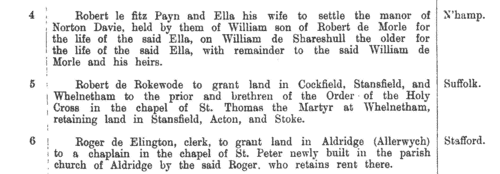
| Landowners and tenants in Wiltshire
(1345-1485)
Inquisitions ad quod damnum were held by the appropriate sheriff or escheator (or other officer in whose bailiwick the matter in question might lie) to investigate cases in which the royal or public interest might be damaged by proposed alienation or settlement of land (especially alienation to religious uses, into mortmain). The key findings from these inquisitions were as to the tenure of the land and the service due from it; its yearly value; the lands remaining to the grantor, and whether they sufficed to discharge all duties and customs due from him; and whether he can still be put upon juries, assizes and recognitions, so that the country be not burdened by his withdrawal from them. Generally speaking, this process had the makings of a system of licensing such alienations, and raising money in proportion to the valuations. Equally, there are many items that deal with subjects such as the closing of public roads, the felling or inclosing of woods, or the proposed grant of liberties or immunities. A calendar of these inquisitions from the 19th year of the reign of king Edward III to the 2nd year of Richard III was prepared by the Public Record Office and published in 1906. We have now indexed this calendar by surname and county. Most of the individuals appearing in the calendar are either pious individuals seeking to make grants to religious bodies for the sake of their souls; or landowners securing the disposition and settling of their real estate. But some other names do appear - tenants, trustees, chaplains and clerks.JOCE. Cost: £6.00.  | Sample scan, click to enlarge
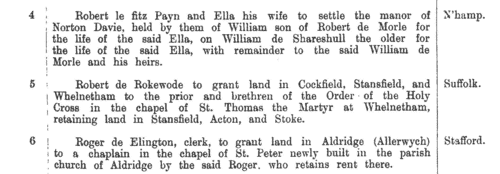
| Somerset testators and legatees
(1501-1530)
Somerset was almost coextensive with the diocese of Bath and Wells, which exercised local probate jurisdiction through its consistory and archdeaconry courts: but superior to the diocese was the province of Canterbury. Somerset testators who also had property outside the county had their wills proved in the Prerogative Court of Canterbury (PCC). The Somerset Record Society embarked on a program of publishing genealogical abstracts of the registered copy wills of Somerset testators in the PCC archives, and in 1903 (volume xvi) printed abstracts edited by the Reverend F. W. Weaver from the PCC registers 1501-1503 (register Blamyr), 1504-1506 (Holgrave), 1506-1508 (Adeane), 1508-1511 (Bennett), 1511-1514 (Fetiplace), 1514-1517 (Holder), 1517-1520 (Ayloffe), 1520-1522 (Maynwaryng), 1523-1525 (Bodfelde), 1525-1528 (Porch) and 1529-1530 (Jankyn). In addition, the volume includes abstracts of 48 Somerset copy wills in the registers of the Archbishops of Canterbury at Lambeth Palace Library from 1363 to 1491. The heading of each abstract gives the year of making the will (not the year of probate) and the testator's name in bold. Below that is the quire number and name of the PCC register. Date and details of probate are given at the foot of each abstract. Spellings of surnames are preserved as they appear in the registered copy wills, and may vary within a single document.JOCE. Cost: £4.00.  | Sample scan, click to enlarge

| Penshurst Manuscripts
(1150-1580)
C. L. Kingsford prepared a calendar of the papers of Lord de L'Isle and Dudley at Penshurst Place in Kent for the Historical Manuscripts Commission, of which this first volume was published in 1925. The material is presented in eleven sections: I. 39 deeds relating to the Sydney family's Surrey and Sussex estates from about 1150 to 1502; II. Summary notes on deeds from these and other English counties (mainly Essex, Kent, Lincolnshire and Yorkshire) and from Wales and Ireland; III. Documents relating to Robertsbridge Abbey in Sussex (charters and deeds; rentals; court rolls; reeve's accounts at Footland; and bursar's accounts) from 1160 onwards; IV. Deeds and documents relating to the church and college of Tattershall in Lincolnshire (deeds; statutes and ordinances; miscellaneous papers; court rolls; and accounts (warden's, steward's, precentor's and impositor's, receiver's, bailiffs', and building and post-dissolution accounts); V. Family papers and estates accounts of the Cromwells of Tattershall (general accounts and wills; accounts of stewards of the household; building accounts of Tattershall castle; estate accounts); VI. Summary lists of various rolls, rentals, surveys and accounts, from various counties (mainly Kent and Lincolnshire); VII. Documents relating to Penshurst and its owners; VIII. Sydney family papers; IX. Accounts of the ironworks at Robertsbridge and in Glamorgan; X. Papers relating to the Council of Wales, 1526 to 1580; and XI. Irish Accounts, from sir Henry Sydney's terms as Vice-Treasurer and Lord Deputy of Ireland, 1556 to 1578.JOCE. Cost: £4.00.  | Sample scan, click to enlarge

| Hastings family deeds
(1100-1600)
John Harley of the Historical Manuscripts Commission was invited by Reginald Rawdon Hastings to examine his family's extensive archives at the Manor House, Ashby de la Zouche, in Leicestershire. Harley produced a detailed calendar, of which is the first volume, published in 1928, Hastings himself having since died, and Harley having been killed at Gallipoli. This volume covers four categories of the records: the Ancient Deeds; Manorial and other Documents; Accounts and Inventories; and Miscellaneous Papers. Most, but not all, of the material is mediaeval. About half of the deeds relate to the family property in Leicestershire; then there are sections for Derbyshire, Nottinghamshire, Northamptonshire, Lincolnshire, Warwickshire, Staffordshire, Yorkshire, Northumberland, Norfolk, Cambridgeshire, Huntingdonshire, London, Wiltshire, Somersetshire, Devonshire, Buckinghamshire, Oxfordshire, &c. The manorial section includes a partitions of the estates of the Earls of Leicester and Wilton about 1204 and 1277; manor court rolls are mentioned, but not extracted. Choicer items from the family accounts and inventories are copied in extenso for 1596 and 1607, and thereafter summarised. Most of the later material is merely dipped into for curiosities.JOCE. Cost: £4.00.  | Sample scan, click to enlarge

| PCC Probates and Administrations
(1630)
The Prerogative Court of Canterbury's main jurisdiction was central and southern England and Wales, as well as over sailors &c dying abroad: these brief abstracts, compiled under the title "Year Books of Probates", and printed in 1902, usually give address, date of probate and name of executor or administrator. They are based on the Probate Act Books, cross-checked with the original wills, from which additional details are, occasionally, added. The original spelling of surnames was retained, but christian and place names have been modernised where necessary.JOCE. Cost: £2.00.  | Sample scan, click to enlarge
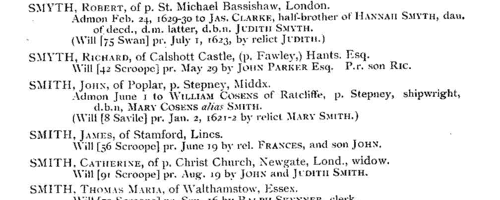
| PCC Probates and Administrations
(1634)
The Prerogative Court of Canterbury's main jurisdiction was central and southern England and Wales, as well as over sailors &c dying abroad: these brief abstracts, compiled under the title "Year Books of Probates", and printed in 1902, usually give address, date of probate and name of executor or administrator. They are based on the Probate Act Books, cross-checked with the original wills, from which additional details are, occasionally, added. The original spelling of surnames was retained, but christian and place names have been modernised where necessary.JOCE. Cost: £2.00.  | Sample scan, click to enlarge
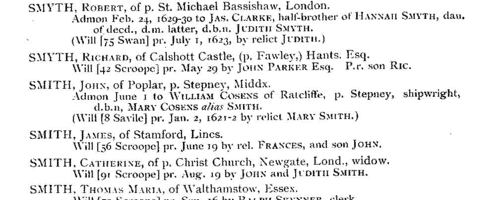
| PCC Probates and Administrations
(1648)
The Prerogative Court of Canterbury's main jurisdiction was central and southern England and Wales, as well as over sailors &c dying abroad: these brief abstracts, compiled under the title "Year Books of Probates", and printed in 1906, usually give address, date of probate and name of executor or administrator. They are based on the Probate Act Books, cross-checked with the original wills, from which additional details are, occasionally, added. The original spelling of surnames was retained, but christian and place names have been modernised where necessary.JOCE. Cost: £2.00.  | Sample scan, click to enlarge
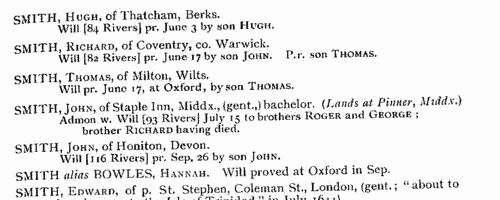
| Testators and legatees in London
(1358-1688)
The Court of Husting of the city of London sat (usually on a Monday) each week: among its functions was the enrolment of deeds and wills relating to citizens of London. In their strictest technical sense the terms 'will' and 'devise' are appropriate to real estate, and the terms 'testament', 'bequest' and 'legacy' to personal estate, but this distinction is lost sight of in ordinary usage. This calendar of wills proved and enrolled in the Court of Husting was edited by Reginald R. Sharpe, records clerk in the office of the Town Clerk of the City of London, and printed by order of the corporation in 1890. The date of the court is given in italics, with the year in bold in the margin. The testator's name is given in capitals (surname first, in bold), and then a brief listing of substantial bequests, with the names of legatees, and then the date of making of the will, and reference. The bulk of the wills in this volume are from before 1600. JOCE. Cost: £4.00.  | Sample scan, click to enlarge

|  Apprentices registered in Exeter
(1755) Apprentices registered in Exeter
(1755)
Apprenticeship indentures and clerks' articles were subject to a 6d or 12d per pound stamp duty: the registers of the payments usually give the master's trade, address, and occupation, and the apprentice's name, as well as details of the date and length of the apprenticeship. There are central registers for collections of the stamp duty in London, as well as returns from collectors in the provinces. These collectors generally received duty just from their own county, but sometimes from further afield. The indentures themselves can date from a year or two earlier than this return. (The sample entry shown on this scan is taken from a Liverpool return. Each entry has two scans, the other being the facing page with the details of the indenture, length of service, and payment of duty.) IR 1/52JOCE. Cost: £8.00.  | Sample scan, click to enlarge

|
Research your ancestry, family history, genealogy and one-name study by direct access to original records and archives indexed by surname.
|













